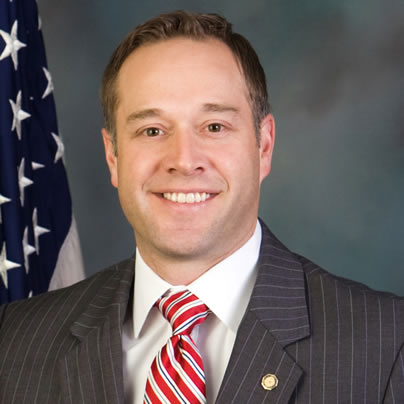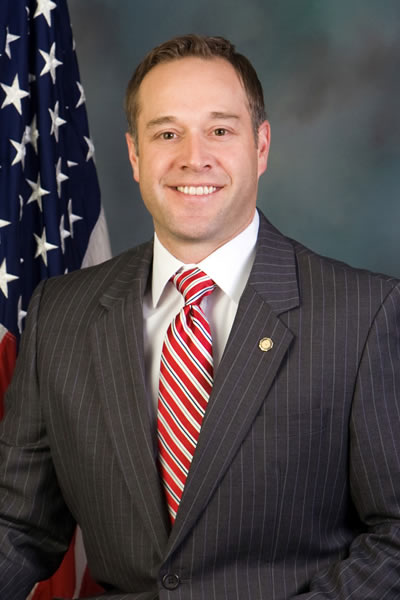Politics
Republican Pa. state lawmaker comes out
Fleck says he’s still ‘a servant of God and the public’

A Republican state lawmaker in Pennsylvania came out in an interview a local newspaper published on Saturday.
“Coming out is hard enough, but doing it in the public eye is definitely something I never anticipated,” state Rep. Mike Fleck told the Huntingdon (Pa.) Daily News. “I’m still the exact same person and I’m still a Republican and most importantly, I’m still a person of faith trying to live life as a servant of God and the public. The only difference now is that I will also be doing so as honestly as I know how.”
Fleck, who became an Eagle Scout in 1991, has represented portions of Blair, Huntingdon and Mifflin Counties in the Pennsylvania House of Representatives since voters first elected him in Nov. 2006. The 1995 graduate of Liberty University in Lynchburg, Va., became a district executive for the Boy Scouts of America once he earned his degree in history with a minor in youth ministry and returned to Huntington County in central Pennsylvania.
The organization in July reaffirmed its ban on out members and openly gay scoutmasters and troop leaders. Fleck told the Huntingdon Daily News his “livelihood depended on hiding my true sexual orientation, something I was very good at.”
The newspaper further reported Fleck suppressed his homosexuality throughout his 20s. He married his wife in 2002 after they dated for two years.
“She was everything I could have ever asked for and to this day she is still my best friend,” Fleck told the Huntingdon Daily News. “I sought out treatment from a Christian counselor, but when that didn’t work out, I engaged a secular therapist who told me point blank that I was gay and that I was too caught up in being the perfect Christian rather than actually being authentic and honest.”
The newspaper reported that Fleck and his wife separated last year — he said they “became closer than ever before, but it was bittersweet as we both concluded that the marriage was over.” Fleck told the Huntingdon Daily News he continues to reconcile his homosexuality with his Christian faith.
“Through years of counseling, I’ve met a lot of gay Christians who have tried hard to change their God-given sexual orientation, but at the end of the day, I know of none who’ve been successful,” he told the newspaper. “They’ve only succeeded at repressing their identity, only to have it reappear time and time again and always wreaking havoc not only on themselves, but especially on their family.”
Fleck came out less than seven months after Philadelphia lawyer Brian Sims became the first openly gay person elected to the state legislature when he won a seat in the Pennsylvania House of Representatives. Tim Brown will be the only other openly gay Republican state lawmaker in the country who’s poised to take a seat. He won election to the Ohio House of Representatives on Nov. 6.
Former Massachusetts lieutenant gubernatorial candidate Richard Tisei last month narrowly lost against incumbent Congressman John Tierney.
Fleck did not immediately return the Washington Blade’s requests for comment, but LGBT advocates in Pennsylvania and across the country welcomed his decision to come out.
“It is definitely quite a big deal,” Ted Martin, executive director of Equality Pennsylvania, told the Blade earlier on Monday. “Along with Brian [Sims] we’ll have now two openly gay legislators, so for a state like Pennsylvania that just voted Brian in in May it’s pretty remarkable.”
Victory Fund CEO Chuck Wolfe agreed.
“Coming out is never easy, but coming out in the public eye is particularly difficult,” he said, noting the Victory Fund worked with Fleck through his coming out process. “Representative Fleck made a difficult decision to be honest and open with his constituents and colleagues, and that has the power to change hearts and minds. We applaud his courage.”
“State Representative Mike Fleck is to be commended for his honesty,” Casey Pick of Log Cabin Republicans added. “The journey is never easy, but by coming out Rep. Fleck puts a human face on these issues, demonstrating that you can be a conservative, a person of faith and a good Republican while also a member of the LGBT community. Having an openly gay member of the Republican caucus in Pennsylvania brings us that much closer to achieving freedom and equality under the law.”
Martin said he hopes to discuss efforts to ban anti-LGBT discrimination in Pennsylvania and to fight bullying in the commonwealth with Fleck when they meet in the near future. He noted state law does not protect the newly out lawmaker and other gay Pennsylvanians from housing discrimination based on their sexual orientation.
“My hope is that this will actually in a larger way cause people to talk about issues in Pennsylvania just like that,” he said, specifically referring to anti-bullying and anti-discrimination efforts. “My hope is that it will give people some ability to start saying, you know what, we’ve ignored these issues for long in the legislature and in many different ways in Pennsylvania that we need to start thinking about them.”
Sims, who told the Blade he has spoken with Fleck several times in recent days, stressed the same point.
“Pennsylvania doesn’t have LGBT non-discrimination,” he said. “We’ve seen in some other states that Republicans can get behind the idea of statewide LGBT non-discrimination and I’m hoping that Rep. Fleck gives us an opportunity to really speak directly to the leadership in the state about why this is so important.”
Politics
After Biden signs TikTok ban its CEO vows federal court battle
“Rest assured, we aren’t going anywhere,” CEO said

President Joe Biden signed an appropriations bill into law on Wednesday that provides multi-billion dollar funding and military aid for Ukraine, Israel, and Taiwan after months of delay and Congressional infighting.
A separate bill Biden signed within the aid package contained a bipartisan provision that will ban the popular social media app TikTok from the United States if its Chinese parent company ByteDance does not sell off the American subsidiary.
Reacting, TikTok CEO Shou Zi Chew said Wednesday that the Culver City, Calif.-based company would go to court to try to remain online in the U.S.
In a video posted on the company’s social media accounts, Chew denounced the potential ban: “Make no mistake, this is a ban, a ban of TikTok and a ban on you and your voice,” Chew said. “Rest assured, we aren’t going anywhere. We are confident and we will keep fighting for your rights in the courts. The facts and the constitution are on our side, and we expect to prevail,” he added.
Our response to the TikTok Ban Bill in the US: https://t.co/LpoE67sxHo
— TikTokComms (@TikTokComms) April 24, 2024
White House Press Secretary Karine Jean-Pierre adamantly denied during a press briefing on Wednesday that the bill constitutes a ban, reiterating the administration’s hope that TikTok will be purchased by a third-party buyer and referencing media reports about the many firms that are interested.
Chew has repeatedly testified in both the House and Senate regarding ByteDance’s ability to mine personal data of its 170 million plus American subscribers, maintaining that user data is secure and not shared with either ByteDance nor agencies of the Chinese government. The testimony failed to assuage lawmakers’ doubts.
In an email, the former chair of the House Intelligence Committee, U.S. Rep. Adam Schiff (D-Calif.), who doesn’t support a blanket ban of the app, told the Washington Blade:
“As the former chairman of the House Intelligence Committee, I have long worked to safeguard Americans’ freedoms and security both at home and abroad. The Chinese Communist Party’s ability to exploit private user data and to manipulate public opinion through TikTok present serious national security concerns. For that reason, I believe that divestiture presents the best option to preserve access to the platform, while ameliorating these risks. I do not support a ban on TikTok while there are other less restrictive means available, and this legislation will give the administration the leverage and authority to require divestiture.”
A spokesperson for U.S. Sen. Alex Padilla (D-Calif.) told the Blade: “Senator Padilla believes we can support speech and creativity while also protecting data privacy and security. TikTok’s relationship to the Chinese Communist Party poses significant data privacy concerns. He will continue working with the Biden-Harris administration and his colleagues in Congress to safeguard Americans’ data privacy and foster continued innovation.”
The law, which gives ByteDance 270 days to divest TikTok’s U.S. assets, expires with a January 19, 2025 deadline for a sale. The date is one day before Biden’s term is set to expire, although he could extend the deadline by three months if he determines ByteDance is making progress or the transaction faces uncertainty in a federal court.
Former President Donald Trump’s executive order in 2020, which sought to ban TikTok and Chinese-owned WeChat, a unit of Beijing-based Tencent, in the U.S., was blocked by federal courts.
TikTok has previously fought efforts to ban its widely popular app by the state of Montana last year, in a case that saw a federal judge in Helena block that state ban, citing free-speech grounds.
The South China Morning Post reported this week that the four-year battle over TikTok is a significant front in a war over the internet and technology between Washington and Beijing. Last week, Apple said China had ordered it to remove Meta Platforms’s WhatsApp and Threads from its App Store in China over Chinese national security concerns.
A spokesperson for the ACLU told the Blade in a statement that “banning or requiring divestiture of TikTok would set an alarming global precedent for excessive government control over social media platforms.”
LGBTQ TikToker users are alarmed, fearing that a ban will represent the disruption of networks of support and activism. However, queer social media influencers who operate on multiple platforms expressed some doubts as to long term impact.
Los Angeles Blade contributor Chris Stanley told the Blade:
“It might affect us slightly, because TikTok is so easy to go viral on. Which obviously means more brand deals, etc. However they also suppress and shadow ban LGBTQ creators frequently. But we will definitely be focusing our energy more on other platforms with this uncertainty going forward. Lucky for us, we aren’t one trick ponies and have multiple other platforms built.”
Brooklyn, N.Y.,-based gay social media creator and influencer Artem Bezrukavenko told the Blade:
“For smart creators it won’t because they have multiple platforms. For people who put all their livelihood yes. Like people who do livestreams,” he said adding: “Personally I’m happy it gets banned or American company will own it so they will be less homophobic to us.”
TikTok’s LGBTQ following has generally positive experiences although there have been widely reported instances of users, notably transgender users, seemingly targeted by the platform’s algorithms and having their accounts banned or repeatedly suspended.
Of greater concern is the staggering rise in anti-LGBTQ violence and threats on the platform prompting LGBTQ advocacy group GLAAD, in its annual Social Media Safety Index, to give TikTok a failing score on LGBTQ safety.
Additional reporting by Christopher Kane
Politics
Smithsonian staff concerned about future of LGBTQ programming amid GOP scrutiny
Secretary Lonnie Bunch says ‘LGBTQ+ content is welcome’

Staff at the Smithsonian Institution are concerned about the future of LGBTQ programming as several events featuring a drag performer were cancelled or postponed following scrutiny by House Republicans, according to emails reviewed by the Washington Post.
In December, Secretary Lonnie G. Bunch III appeared before a hearing led by GOP members of the Committee on House Administration, who flagged concerns about the Smithsonian’s involvement in “the Left’s indoctrination of our children.”
Under questioning from U.S. Rep. Stephanie Bice (R-Okla.), Bunch said he was “surprised” to learn the Smithsonian had hosted six drag events over the past three years, telling the lawmakers “It’s not appropriate to expose children” to these performances.
Collaborations with drag artist Pattie Gonia in December, January, and March were subsequently postponed or cancelled, the Post reported on Saturday, adding that a Smithsonian spokesperson blamed “budgetary constraints and other resource issues” and the museums are still developing programming for Pride month in June.
“I, along with all senior leaders, take seriously the concerns expressed by staff and will continue to do so,” Bunch said in a statement to the paper. “As we have reiterated, LGBTQ+ content is welcome at the Smithsonian.”
The secretary sent an email on Friday expressing plans to meet with leaders of the Smithsonian Pride Alliance, one of the two groups that detailed their concerns to him following December’s hearing.
Bunch told the Pride Alliance in January that with his response to Bice’s question, his intention was to “immediately stress that the Smithsonian does not expose children to inappropriate content.”
“A hearing setting does not give you ample time to expand,” he said, adding that with more time he would have spoken “more broadly about the merits and goals of our programming and content development and how we equip parents to make choices about what content their children experience.”
Politics
Survey finds support for Biden among LGBTQ adults persists despite misgivings
Data for Progress previewed the results exclusively with the Blade

A new survey by Data for Progress found LGBTQ adults overwhelmingly favor President Joe Biden and Democrats over his 2024 rival former President Donald Trump and Republicans, but responses to other questions may signal potential headwinds for Biden’s reelection campaign.
The organization shared the findings of its poll, which included 873 respondents from across the country including an oversample of transgender adults, exclusively with the Washington Blade on Thursday.
Despite the clear margin of support for the president, with only 22 percent of respondents reporting that they have a very favorable or somewhat favorable opinion of Trump, answers were more mixed when it came to assessments of Biden’s performance over the past four years and his party’s record of protecting queer and trans Americans.
Forty-five percent of respondents said the Biden-Harris administration has performed better than they expected, while 47 percent said the administration’s record has been worse than they anticipated. A greater margin of trans adults in the survey — 52 vs. 37 percent — said their expectations were not met.
Seventy precent of all LGBTQ respondents and 81 percent of those who identify as trans said the Democratic Party should be doing more for queer and trans folks, while just 24 percent of all survey participants and 17 percent of trans participants agreed the party is already doing enough.
With respect to the issues respondents care about the most when deciding between the candidates on their ballots, LGBTQ issues were second only to the economy, eclipsing other considerations like abortion and threats to democracy.
These answers may reflect heightened fear and anxiety among LGBTQ adults as a consequence of the dramatic uptick over the past few years in rhetorical, legislative, and violent bias-motivated attacks against the community, especially targeting queer and trans folks.
The survey found that while LGBTQ adults are highly motivated to vote in November, there are signs of ennui. For example, enthusiasm was substantially lower among those aged 18 to 24 and 25 to 39 compared with adults 40 and older. And a plurality of younger LGBTQ respondents said they believe that neither of the country’s two major political parties care about them.
-

 State Department3 days ago
State Department3 days agoState Department releases annual human rights report
-

 Maryland4 days ago
Maryland4 days agoJoe Vogel campaign holds ‘Big Gay Canvass Kickoff’
-

 Politics3 days ago
Politics3 days agoSmithsonian staff concerned about future of LGBTQ programming amid GOP scrutiny
-

 District of Columbia19 hours ago
District of Columbia19 hours agoCatching up with the asexuals and aromantics of D.C.












